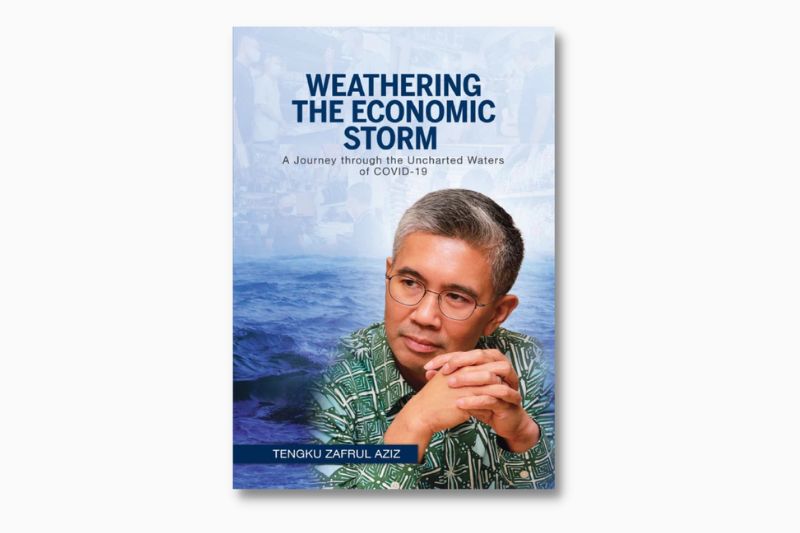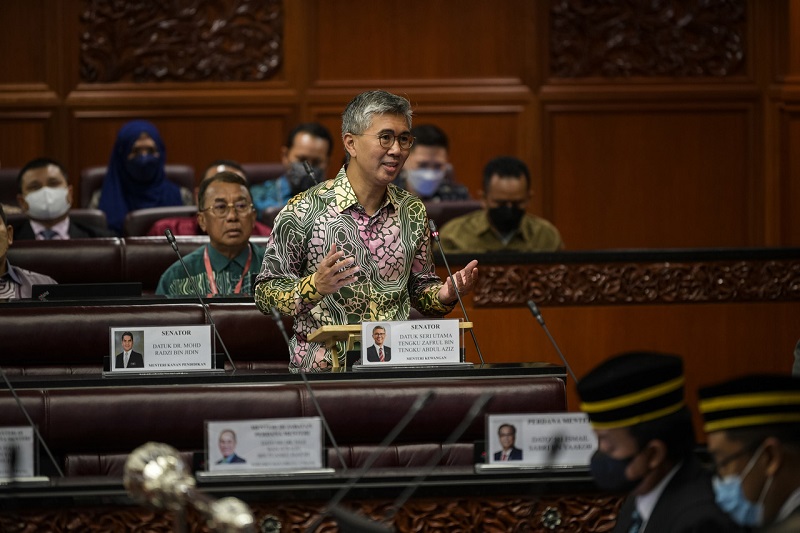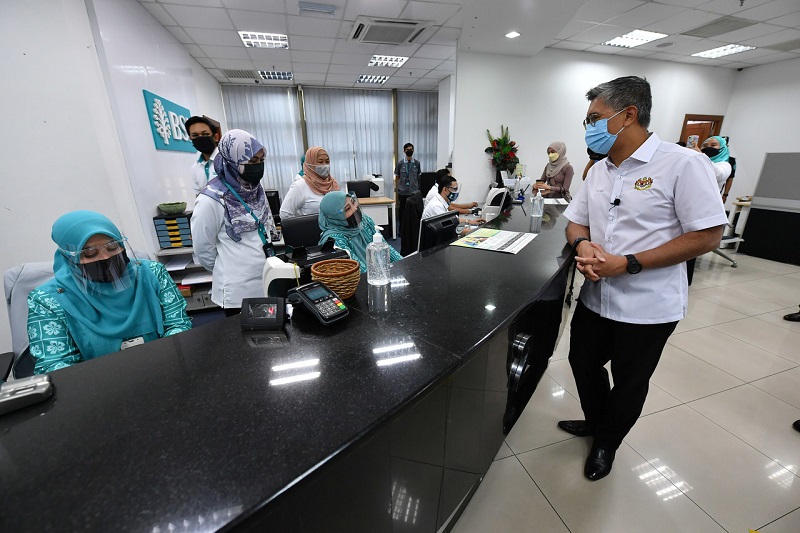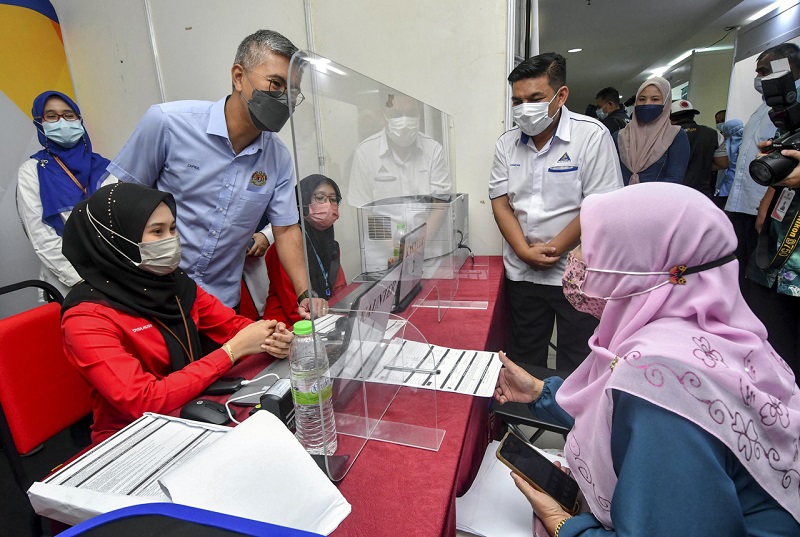
Although Zafrul wrote daily reports, it was not the same as writing a book, so he looked to the tomes he enjoys reading for inspiration (Photo: SooPhye)
In his preface for Senator Tengku Datuk Seri Zafrul Abdul Aziz’s new book Weathering the Economic Storm — A Journey through the Uncharted Waters of Covid-19, former deputy prime minister Tun Musa Hitam has this to say about the country’s first technocrat finance minister: “A rare species these days in Malaysian politics when proven political loyalty based on partisan politics — rather than qualification and experience — reigns supreme.” On the new book itself, which is about the Ministry of Finance’s (MoF) journey in navigating the unchartered waters of Covid-19, Musa says: “In the history of the Malaysian government, I cannot remember any serving minister writing a book by themselves giving out details on how any national crisis is being taken care of with reasonable positive success.”
Whether or not one agrees with the circumstances surrounding Zafrul’s appointment two years ago, it is hard to deny that he has done a commendable job of holding us above water as the pandemic raged. “Saving lives is one thing, saving livelihoods is another,” he says, rubbing his chin wearily. Indeed, while there was an outpouring of sympathy and support for our medical frontliners — and, certainly, this was more than deserved — it is only in retrospect that we can properly recognise the contributions of the economic frontliners who saved the nation from financial ruin.
This was one of the major reasons for penning Weathering the Economic Storm, which Zafrul, 49, did in just four months. “I have been writing op-eds to share with the public what we were facing and what we were doing. I document a lot — it’s an old habit of mine — and I really talked a lot about what we were doing. Through this book, I wanted to put on record the valuable contribution of our economic frontliners as well, from ministries to agencies, and to document the key policies that were crafted and implemented during the pandemic. It’s how we tried to prevent the economy from tanking and when the time was right, when we started rebuilding the economy. We thought this deserved to be archived for public consumption and future reference,” he says. The raison d’être of the book? “First, it is to celebrate and pay tribute to our economic frontliners; second, to put on record the key learnings from the pandemic; and, third, [it] is testament [to] our character during tough times.”
weathering_the_economic_storm_-_a_journey_through_the_unchartered_waters_of_covid-19.jpg

A former analyst turned banker — when he was appointed as senator and then finance minister on March 9, 2020, Zafrul had clocked five years as group CEO of CIMB — he initially planned to write the book in a more academic style but was discouraged by his team at the MoF who were in favour of a simpler format that was more accessible to a wider audience.
“My style as an analyst is to report facts and figures and provide an academic paper, but my colleagues told me no one would read it,” he laughs. “We were working with the Asian School of Business but, as rightly advised by my colleagues, it wouldn’t be read by too many people. So, the agreement was to do both.”
It was good advice, as Weathering the Economic Storm is quite an absorbing book, put together in a way that is not only easy to read but fascinating as well. It also cleverly puts in context events of the past 24 months or so by including news articles relating to MoF’s decisions to stabilise the economy in such uncertain times, supported by commentary from Zafrul on why certain actions were taken. This is his chance to explain his point of view, uninterrupted, and he has grabbed that opportunity with both hands.
“It is a compilation of thoughts I’ve articulated in various op-eds. I took the opportunity to explain what I’ve said, although the team took out a lot of the pie charts I put in,” he quips. “It’s all the articles that ran throughout the pandemic, and the thinking behind each policy. I’ve tried to make it as simple as possible for as many people to read. I must thank the team for helping me out, [or] else it would have been a very [academic] book!”
Although Zafrul wrote daily reports, it was not the same as writing a book, which calls for a different skill altogether, so he looked to the tomes he enjoys reading for inspiration. “I was told: Make people understand. I used to read [American economist] Paul Krugman’s books in my university days, and I do read a lot of autobiographies as well. Most of the time, even the Malaysian authors I enjoy reading write about Malaysia really well,” he says, referring to schoolmate, the late Rehman Rashid, whose prose was simultaneously cerebral and poetic.
fw1251760_kl19_11082022_dewan_negara_bn202208074097-lpr.jpg

Zafrul is a better storyteller than he gives himself credit for, as his writing style is relaxed without being too informal and carries the weight of the subject matter with enough gravity. The book is broken up into three sections — Responsive, Responsible and Reformist, which is actually the tagline of MoF.
“You want to keep everyone engaged and focused, which is something I learnt in my corporate career running a banking group. Everybody must be clear on what we want to achieve, and one way to do that is to have a tagline. I want MoF to be responsible for the funding policies during the pandemic to save lives and livelihoods from falling over the edge, and we have to be ‘responsive’ to what people need to survive. ‘Responsible’ here also refers to the fiscal space — to be able to borrow and pay responsibly. We were the ones to set up the debt-to-GDP limit of 65%, something that hadn’t been imposed before.
“And then [there are] ‘reforms’ — it is important that while we tackle short-term challenges, we must also consider that whatever measures we are introducing works in the longer term, as we should never waste a good crisis. In short, the 3R’s are meant to remind us that we are not here just for the nation’s immediate needs, but also for future growth and resiliency.”
In lieu of a lengthy review of Weathering the Economic Storm, we have this to say: The book is a must-read for the way it maps out key economic decisions made during the pandemic, when MoF’s sole objective was to keep the nation afloat. No one could have anticipated what Covid-19 would do to us or how the lockdowns were going to affect everyday Malaysians — it was unprecedented, and there was no playbook to follow. Every nation across the globe had unique considerations as they tackled the crisis. As such, Zafrul and his team took a long hard look at the challenges that lay ahead, and made the decisions accordingly.
Were they all correct? Although the answer to this is predominantly in the affirmative, Zafrul says there are some things that he would have done differently, particularly pertaining to the wage subsidies — MoF could have been more strict in its disbursement. “Malaysians are very creative,” he jokes. “When you move fast, you must accept there will be errors. Even in the UK, the parliament was saying the chancellor was too reckless in giving aid, so people abused it. Everyone is creative, although to be fair, we didn’t know our people would get that creative. We need to be more stringent next time. We did what we could knowing what we did, so now we know better how to do this.”
fw1184380_ptj04_06092021_bkc_bn202109051951-lpr.jpg

Indeed, the disbursement of funds was one of the most significant problems Zafrul and his team faced during the pandemic. “You would have assumed the biggest challenge was how to raise funds for the various stimulus packages, but, to me, the key obstacle was execution, because there was an absence of data. For example, when we wanted to help the stall owners, the penjaja, who live day to day, we didn’t have enough records! So, we went through the local councils, through SSM (the Companies Commission of Malaysia), everything — we had data on only 500,000 traders.
“But we knew there had to be more! The final number was 1.5 million, which we got when we opened for registration and told them to sign up themselves. Then, some of them didn’t have business bank accounts for us to give them the money, which also needed to be seen to. Now, we have the database, and we know. The pandemic gave us better, cleaner data.”
Delivering aid also proved to be difficult; the government machinery was simply unable to ensure everyone who needed help received it. Many agencies adapted their roles to assist with this, which led to yet another challenge: getting all the implementing agencies and ministries, particularly statutory bodies, to be more coordinated. “We had the Covid-19 bill, for example, to ensure there were extra funds and to determine which agencies were in charge of them — Socso and Perkeso were doing upskilling, the Inland Revenue (Board) took care of disbursements, and so on. This was all done very quickly. We all learnt and we learnt fast, and as the economy started to open up, we all breathed a sigh of relief.”
•••
The last time Options met with Zafrul was for the 2016 CIMB Classics, which pertained to a job in what he calls his previous life. A healthy diet and a regular exercise routine has kept him as trim as we remember, but his hair is definitely more salt than pepper these days. Being the finance minister — that, too, in the throes of a public health crisis — has not been easy by any means.
“It’s more taxing, I must admit; I spend a lot of time thinking, evaluating past measures and planning for the execution of policies,” Zafrul says, comparing his pre- and post-ministerial existence. “Even now when I exercise, I am thinking — at the gym, in between sets, I am sending WhatsApp messages to my team. I never used to do that! I always tend to ask myself whether I’ve done enough … The responsibility and accountability is so great now.
“But I have no complaints because serving the country and her people is a privilege and honour. Before I joined the public sector, I was in a bubble. I took for granted what the government does for us and what people in Malaysia are going through. I know now how lucky we are. Ignorance is bliss, but it sometimes breeds arrogance.” He stops and thinks for a second before adding, “I can see that the pandemic has made me more nationalistic than I ever was.”
fw1219584_kb04_15012022_jelajah_bajet-lpr.jpg

Staying healthy and keeping to his rigorous habits has helped tremendously — aside from being physically and mentally fit for a demanding job, the discipline required to stay healthy has also been good for him. “In this job, you need to be healthy and think fast — if you tire quickly, you can’t last as long. The stamina sports has given me helps. But, to be healthy, you need to be very disciplined — so much prep is required for a race, for example, much like the case of preparing for a budget.”
There are many parallels between the sports he participates in — he has completed the six world marathon majors and an Ironman race — and his day-to-day job of managing the country’s economy. References to his completion of Ironman are in the book, based on the example of “team work making the dream work”: Although the accolade is granted to an individual, the candidate requires the support and assistance of an entire team to succeed. “Executing reforms is similar to training for the Ironman,” Zafrul writes. “We must learn to conquer our fears of making difficult but necessary decisions by properly assessing all the risks and religiously sticking to the plan, while also being agile to face changes in circumstances.”
He shows his vulnerable side in this section of the book, detailing how nervous he was about taking on the 3.9km swim part of the race — but faith, perseverance, practice and support helped the man who could barely complete a 25m dash in a swimming pool to take on the open sea. A lesson he has brought to MoF is that anything worth doing is going to be wrought with challenges, but they can be overcome.
There are valuable lessons to be learnt from marathons too. A good example is the “wall” that runners hit around the 30km mark (a full marathon is 42km) — it is the point when the glycogen within their muscles is depleted. This forces them to slow down considerably, losing valuable time in the race. When Zafrul reaches this point, this is what he visualises: “One, I cannot fail,” he says, counting down on his fingers. “Two, I think about what I need to do. At the 30km mark, you need to double up what you’re eating and drinking. You must be disciplined enough to stop, which some people don’t want to do. And, three, I cannot let my team down.
“In sports, it’s about hitting a pain threshold. In real life? When you introduce new policies, you will face challenges, even internally. Which is good! So, you have to be able to take it — that’s mental strength. You must believe in what you’re doing but also be open to admit you’re wrong and adjust — agility is important.”
tengku_zafrul_pj10k.jpg

Malaysia has hit a threshold of sorts when it comes to the battle against Covid-19. At press time, news had just broken that the Health Ministry had relaxed the mask mandates, as cases are beginning to fall and deaths are at an all-time low. The economy has all but bounced back, and while there is still a lot of catching up to do, it must be said that our relative political stability over the last one year has resulted in strong economic growth.
Zafrul says, however, that the country cannot rest on her laurels. Instead, we must develop a growth mindset that will keep our collective eye on the future. “A key message would be that we all really need to unite. In my job, I see how competitive the world is becoming and we can’t afford to be looking inwards only. We are a small trading economy; we must look outside. We need to get Malaysians ready to move faster. We started earlier and we have a head start, but the gap is narrowing.
“I don’t know whether this is politically correct to say, but regardless of our political differences, when it comes to the economy, we have to move forward and we shouldn’t place blocks or challenges because of politics. The subsidies, for example, are not sustainable in the long term. Of course, [removing] it is less popular, but we need the funds for development — RM80 billion is a lot! It has helped inflation, but we need to wean ourselves off it. Indonesia has just increased fuel prices, whereas for Malaysia, we plan to better target our subsidies — continuing to help those in need while not wasting subsidies on the wealthy.”
The conversation turns towards politics — sorry, no tips on election dates — and Zafrul’s role in it. “These last 2½ years have taught me that if you can contribute, you should,” he says, thoughtfully. “I still have years to contribute, but because I am not an elected representative, my years are limited. My senatorship ends in February, actually. I don’t think I’m that old; I think I have many years ahead of me. Personality-wise, I believe I should try. If I don’t get the chance, I will find other ways. There is no downside. To me, if I’m not in government, I can go back to the private sector and play my part.”
There is no telling what the future will bring — politics is unpredictable all over the world — but that is what makes things exciting. It is heartening to know that Zafrul is eager to continue playing his part in nation-building efforts, lending his unique skill and experience to strengthening the economy and making Malaysia a better place to live and work in.
Purchase 'Weathering the Economic Storm — A Journey through the Unchartered Waters of Covid-19' for RM80 at MPH Online here.
This article first appeared on Sept 12, 2022 in The Edge Malaysia.


